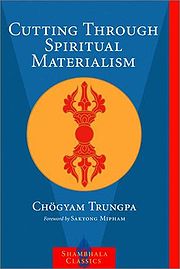
Spiritual materialism
Encyclopedia

Ego (spirituality)
In spirituality, and especially nondual, mystical and eastern meditative traditions, individual existence is often described as a kind of illusion. This "sense of doership" or sense of individual existence is that part which believes it is the human being, and believes it must fight for itself in...
building and confusion creating endeavor. This is based on the idea that ego development is counter to spiritual progress. Chögyam Trungpa
Chögyam Trungpa
Chögyam Trungpa Rinpoche was a Buddhist meditation master and holder of both the Kagyu and Nyingma lineages, the eleventh Trungpa tülku, a tertön, supreme abbot of the Surmang monasteries, scholar, teacher, poet, artist, and originator of a radical re-presentation of Shambhala vision.Recognized...
coined the term spiritual materialism with his book Cutting Through Spiritual Materialism
Cutting Through Spiritual Materialism
Cutting Through Spiritual Materialism is a book addressing many common pitfalls of self-deception in seeking spirituality, which author Chögyam Trungpa Rinpoche coins as Spiritual materialism. The book is the record of two series of lectures given by Trungpa Rinpoche in 1970-71 and is considered...
from talks explaining Buddhism given while opening the Karma Dzong meditation center in Boulder, Colorado
Boulder, Colorado
Boulder is the county seat and most populous city of Boulder County and the 11th most populous city in the U.S. state of Colorado. Boulder is located at the base of the foothills of the Rocky Mountains at an elevation of...
. He expands on the concept in later seminars that became books such as Work, Sex, Money.
Conventionally, it is also used to describe capitalist
Capitalism
Capitalism is an economic system that became dominant in the Western world following the demise of feudalism. There is no consensus on the precise definition nor on how the term should be used as a historical category...
or commercial efforts such as "new age" bookstores and wealthy lecturers on spirituality. Also it might mean the attempt to build up a list of credentials or accumulate teachings in order to present oneself as a more realized or holy person. Author Jorge Ferrer equates the terms, though others draw a distinction that spiritual narcissism
Narcissism
Narcissism is a term with a wide range of meanings, depending on whether it is used to describe a central concept of psychoanalytic theory, a mental illness, a social or cultural problem, or simply a personality trait...
is believing that one deserves love and respect or is better than another because one has accumulated spiritual training instead of the belief that accumulating training will bring an end to suffering.
Lords of Materialism
In Trungpa's presentation, spiritual materialism can fall into three categories — what he calls the three "Lords of Materialism" (Tibetan: lalo literally "barbarian") — in which a form of materialism is mistaken to bring long term happiness but instead only brings short term entertainment, followed by longer term suffering:- Physical materialism is the belief that possessions can bring release from suffering. In Trungpa's view, they may bring temporary happiness but then more suffering in the endless pursuit of creating one's environment to be just right. Or on another level it may cause a misunderstanding like, "I am rich because I have this or that" or "I am a teacher (or whatever) because I have a diploma (or whatever)."
- Psychological materialism is the belief that a particular philosophy, belief system, or point of view will bring release from suffering. So seeking refuge by strongly identifying with a particular religion, philosophy, political party or viewpoint, for example, would be psychological materialism. From this the conventional usage of spiritual materialism arises, by identifying oneself as Buddhist or some other label, or by collecting initiations and spiritual accomplishments, one further constructs a solidified view of ego. Trungpa characterizes the goal of psychological materialism as using external concepts, pretexts, and ideas to prove that the ego-driven self exists, which manifests in a particular competitive attitude.
- Spiritual materialism is the belief that a certain temporary state of mind is a refuge from suffering. An example would be using meditation practices to create a peaceful state of mind, or using drugs or alcohol to remain in a numbed out or a blissful state. According to Trungpa, these states are temporary and merely heighten the suffering when they cease. So attempting to maintain a particular emotional state of mind as a refuge from suffering, or constantly pursuing particular emotional states of mind like being in love, will actually lead to more long term suffering.
Ego
The underlying source of these three approaches to finding happiness is based, according to Trungpa, on the mistaken notion that one's egoEgo (spirituality)
In spirituality, and especially nondual, mystical and eastern meditative traditions, individual existence is often described as a kind of illusion. This "sense of doership" or sense of individual existence is that part which believes it is the human being, and believes it must fight for itself in...
is inherently existent and a valid point of view. He claims that is incorrect, and therefore the materialistic approaches have an invalid basis to begin with. The message in summary is, "Don't try to reinforce your ego through material things, belief systems like religion, or certain emotional states of mind." In his view, the point of religion is to show you that your ego doesn't really exist inherently. Ego is something you build up to make you think you exist, but it is not necessary and in the long run causes more suffering.

